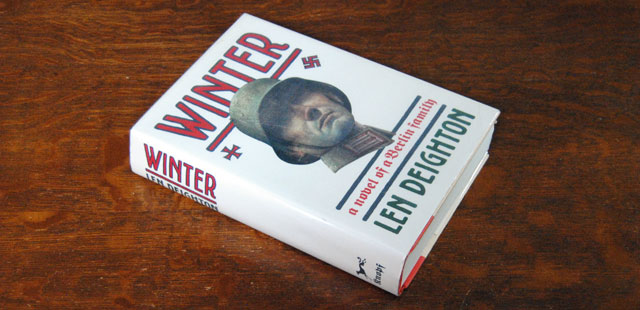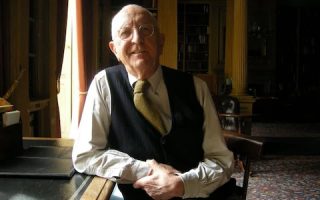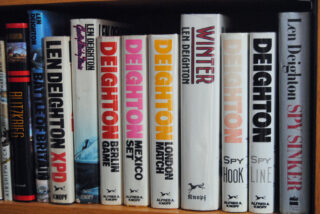
Winter: A Novel of a Berlin Family by Len Deighton is a familial masterpiece. Starting with Harald Winter and focusing on his two sons, Peter and Paul Winter, this novel follows the family’s journey as their spouses and friends are all intertwined in chaotic and random events as history unfolds with World War I and World War II.
This book is Deighton as his most knowledgeable and informative. He sets the scene with history, bringing it alive from politics to the war, and he doesn’t skimp on the technology of the time either. Much of his airship (zeppelin) knowledge is put to great use in the early part of the book.
It is those historic details that not only lace this fiction with fact, but it is that the family Winter has to react and roll with the events. Berlin, Germany, between 1900 and 1945 is perhaps the most volatile place to follow the lives of a single family.
What’s more is that without even focusing on espionage, he gets to utilize tradecraft in a way. You as the reader may know it when you read it, but you also might not realize what was going on until pages later.

Author Len Deighton
Additionally, this book is tangential to the Samson series. The first trilogy of Berlin Game, Mexico Set, and London Match was published before Winter. Here, you get to meet some younger versions and other relatives of the characters from that initial Samson trilogy.
What’s even more striking is that Deighton clearly set out to put brothers Peter and Paul on opposite sides of World War II, but the family still endures as a unit. It’s a slow build but worth every page.
Deighton doesn’t pull any punches, especially in the trenches of World War I, where younger brother Paul is fighting for his country and his life. Through it all is Deighton’s unequivocal talent for using characters and their observations to set the circumstances of the environment: politically, militarily, domestically, and of the human condition.
Examples include but are definitely not limited to:
- …the capacity for cruelty that comes so easily to the self-righteous.
- Berlin had always been a city of spies and informers, and it probably always would be.
- He’d studied other people in the bar, with particular interest in the younger women. He’d had so little free time since the war began–so little time amongst the civilians–that he’d still not got accustomed to the shorter skirts and the display of female ankles. Women had worn full-length skirts since ancient Greece; surely there was something apocalyptic about the new fashion. If not apocalyptic, certainly provocative, especially when some of the younger ones wore these flesh colored stockings!
- “I’m an engineer. Designing, costing, and testing prototypes is about as much as my brain can deal with. I like things I can measure on a micrometer and calculate on a slide rule. I just haven’t got the time, let alone the inclination, for politics.”
- “He came on the stage and looked at the audience in silence for several minutes; then, when everyone was getting nervous, he’d say, ‘Well, that’s enough of the political discussions; now we’ll tell the jokes.’”
- In the dangerous game of espionage, the “common touch” could be a trump card.
- “Speaking with these Krauts has convinced me that there were only three Nazis in the whole of Germany, and no one knows who those three are.”
But my favorite by far is about fiction itself. It seems self-referential, not to be confused with self-congratulatory, but this just may be Deighton’s style.
 “Fiction had unity and style, fiction had a beginning and a proper end, fiction showed evidence of planning and research and usually attempted to impose an orderly pattern upon the chaos of reality.”
“Fiction had unity and style, fiction had a beginning and a proper end, fiction showed evidence of planning and research and usually attempted to impose an orderly pattern upon the chaos of reality.”
In that way, Winter is not quite fiction, even though it is. That quote about fiction comes early on, probably because he’s not going to do that in this fiction, and so it sets an expectation.
Despite its ties to the Samson series, Winter works wonderfully as a one-off book, and it comes highly recommended by your favorite agent.
Read the Secret File of technical information and quotes from Winter.